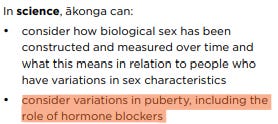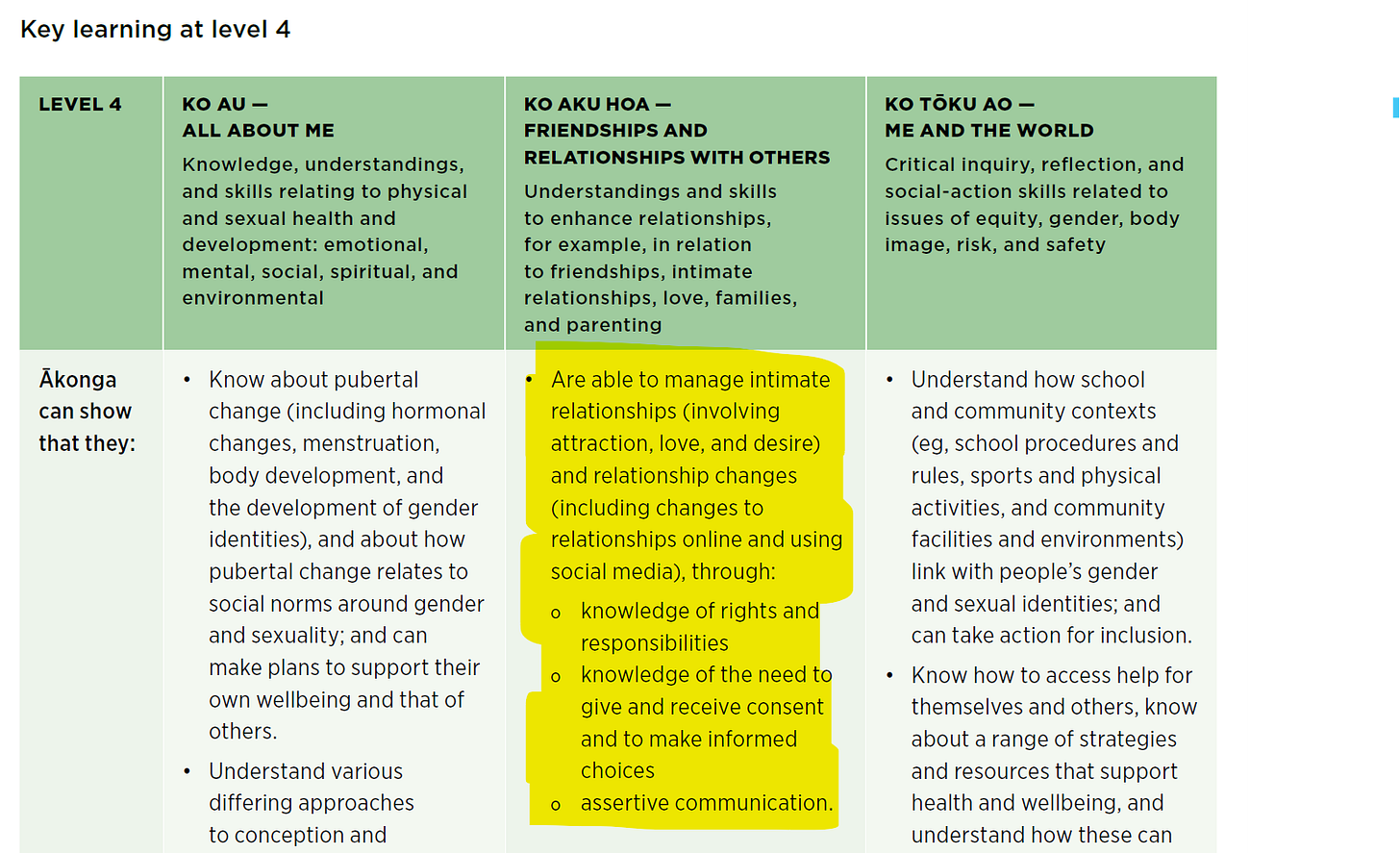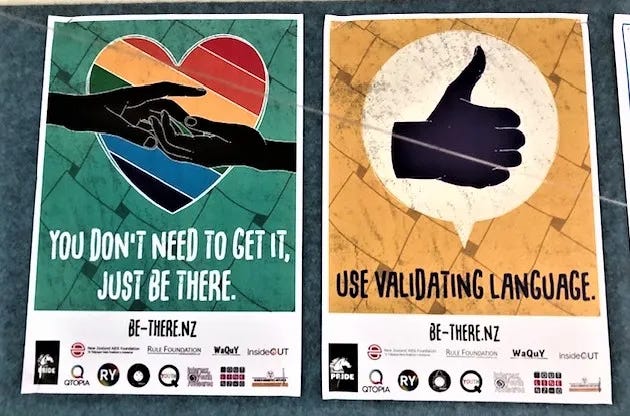ERO dynamics
Will they 'ground' the RSE Guide?
ERO (the Education Review Office) is currently undertaking an evaluation of Relationships and Sexuality Education (RSE) in our schools, as requested by the Minister of Education, Erica Stanford, who asked ERO to find out “how RSE is currently taught and how well it meets the needs of students, expectations of parents and capability of schools”.
To our surprise, Resist Gender Education was invited by ERO to contribute to the consultation, and we have done so, emphatically. Our full submission is available here, or read on for the key points.
Quality RSE
We agree with ERO that, “Quality sexuality education must be more than teaching about biology. It must give our children and young people the skills to discriminate this barrage of media messages, and to keep themselves safe.”
Resist Gender Education defines quality RSE this way:
Children deserve to be taught truthful information about the reproductive and sexual functions of their bodies and how to develop and maintain healthy relationships.
Lessons must be both scientifically accurate and age-appropriate.
Lessons and school practices must also be professionally appropriate and not undermine the values of the local community or the rights of parents.
The 2020 RSE Guide fails on all of the above measures.
The Guide and the school policies the Ministry recommends are themselves a “barrage” of negative messages to children that contain scientifically inaccurate information, harmful advice, and content that is often not age-appropriate.
Truthful information
The belief that everyone has a gender identity that may be different from their sex, or that a person’s self-declared gender identity is more important than their sex, is no more than a belief and as such should not be taught to children as fact.
The Ministry of Education and many teachers seem to be under the misapprehension that ‘trans rights’ are an extension of gay rights and that affirming ‘quirky’ or unhappy children as the opposite sex is the ‘kind and inclusive’ thing to do.
They have completely overlooked the stark differences between gays rights and ‘trans rights’:
Gay rights acknowledge that there are two sexes, the distinct reproductive capacity of each, and do not demand the ‘right’ to medical or surgical treatments.
Gay rights do not require others to forfeit anything or demand fundamental changes to everyday language.
Trans rights reject the science of sex and claim that what a person feels is of most importance and their assertions can literally transform a body into the opposite sex.
Trans rights dictate that everyone else must adhere to the trans way of interpreting and describing gender and sex.
Trans rights demand medical and surgical treatment as a right and put transgender people, often young people influenced by social media, onto a conveyor belt of lifelong medicalisation.
Lumping LGB & TQ together is a false equivalence. Being LGB (lesbian, gay, bisexual) is not a safety risk in itself and does not automatically present safeguarding issues in schools. But being TQ (transgender, queer) is always a safety risk: These children often demand the right to access facilities meant for the opposite sex; they want to simultaneously be secretive about their natal sex and be affirmed in a new identity; they might be talking to strangers online, using breast binders, or seeking experimental hormonal drugs. Schools cannot safely manage the needs of students with a ‘gender identity’ without robust and transparent policies that, firstly, “do no harm”, and secondly, consider the human rights of everyone in the school.
RGE is emphatically opposed to teaching children gender identity beliefs as fact. Transgender beliefs are scientifically false, they contravene established child safeguarding practices, and they harm children by encouraging them to hate their bodies and by leading them towards a lifetime of medical dependence.
Scientifically accurate
When children question their gender, teachers and parents should respond by telling the truth that humans cannot change sex. Instead of treating puberty as something alarming they can opt out of, children should learn that it is an essential step towards fully-functioning adulthood and that, for a large majority of gender- questioning children, when they go through a natural puberty, the dysphoria becomes resolved.
One of the findings of the Cass Review is that “the evidence for the indicated uses of puberty blockers and masculinising/feminising hormones in adolescents are unproven and benefits/harms are unknown.” (p194)
On this one point alone, the RSE Guide is not fit for purpose and needs to be urgently withdrawn from schools. It suggests that children should be introduced in Science lessons to the possibility of taking these powerful, experimental drugs! (RSE Guide Y1-8, p28.)
Children should be free to express themselves and have whatever interests they choose, without being pigeon-holed by adult interpretation of gender, which is inevitably based on sex stereotypes. They should be permitted to exhibit their individual personalities without destabilising suggestions that they may be ‘in the wrong body’.
All children should be accepted and included as the sex they are.
We categorically reject transgender ideology which replaces the objective reality of biological sex with the subjective idea of ‘gender identity’ as the criteria for being a boy or a girl.
Age appropriate
A further concern of parents is the teaching of sexually explicit content at very young ages. The RSE Guide suggests lessons on how to “manage intimate relationships” for twelve year olds, four years before the age of consent.
Although RGE is strongly opposed to ‘gender identity’ being taught as fact, we support it being a topic for critical evaluation for older children because popular culture is awash with transgender ideas and they may also have peers who have adopted a ‘trans’ identity.
RGE has written alternative lesson plans for Levels1-5 of the curriculum. These were written and peer reviewed by practising teachers and demonstrate how the topics of sex, sexuality, gender diversity, consent, and dealing with pornography can all be covered in RSE, at an appropriate age level, without affirming contested transgender beliefs.
Professionally appropriate
Despite a legal requirement to consult with the community, most parents have never been asked, “Do you want your children to be taught to use wrong-sex pronouns and to pretend a classmate has changed sex?”
The MOE advice to schools undermines parental authority, including their duty under:
the Care of Children Act (s.5) for “a child’s care, development, and upbringing to be primarily the responsibility of his or her parents and guardians.”
and
the Crimes Act (s.152) to “take reasonable steps to protect [their] child from injury.”
In breach, variously, of the Bill of Rights Act, the Care of Children Act, and the United Nations Convention on the Rights of Children (Article 3.3), the RSE Guide recommends practices that:
coerce staff and students to acknowledge and affirm other people’s self-identification of gender
advise and counsel students without parental knowledge or input
collude with children to socially transition and to keep this secret from their parents
immediately “affirm” a new gender identity which leaves no room to encourage a child to explore their gender expression and any confusion they may feel when their feelings and preferred behaviour do not fit with sex role stereotypes
prioritise the wishes of a few individuals over the rights and common good of all the children (and staff) in the school.
The suggested practices create conflict between children and their parents and ignore safeguarding policies that have been established to protect children from adult bad actors. A growing number of parents are losing trust in the education system.
We regularly hear from parents who have been unlawfully told by schools that they cannot share the resources to be used in RSE lessons for “copyright reasons”. It is also commonplace for the ‘consultation’ to offer no in-person meetings, or to consist of only a simple tick-box questionnaire where parents agree that they do want their children to learn about puberty and relationships. (See this post for more information about parents’ legal rights for effective consultation.)
With such cursory ‘consultation’ it is easy for parents to remain unaware of the content of RSE lessons and to be horrified and feel betrayed when their children come home from school indoctrinated into the belief that they can be whatever sex they choose.
The practices also ride roughshod over the rights of teachers to hold and express their own beliefs. So entrenched are the ‘gender affirming’ practices that many teachers are hesitant to raise concerns, for fear of losing their jobs.
False flag
A self-declared ‘gender identity’ has been falsely packaged as a ‘human rights’ or ‘social justice’ issue, when it is really a claim for hyper-individualised treatment and enforced behaviour modification in everyone else. Those who immediately ‘affirm’ trans ideation in young people think they are being compassionate but, in reality, they are setting up those children for inevitable emotional and physical turmoil.
There is no such thing as a ‘transgender child’. Children with that label have been created by the adults around them who have pushed an adult concept onto children for their own political or personal benefit. Certainly, many more children do now question their gender, but the questioning is largely driven by social and entertainment media and ill-informed parents and professionals who have been captivated by trans activist slogans.
Why are teenagers being encouraged to follow an ideology without even understanding it?
‘Affirmation’ of a trans identity is not kind; it confirms to a child that their sex is ‘wrong’ and encourages harmful body dissociation and unrealistic aspirations. Much is promised to children, but medical intervention can only ever effect cosmetic change; the child’s sex remains the same.
Adult ideas of gender should not be forced onto children in a school setting where attendance is compulsory and choice is limited. Boards of Trustees must be cognisant of respecting the values and beliefs of everyone in their communities.
The curriculum, the Guide, and the resources
Many parents, as well as Boards of Trustees, are confused and misinformed about these three components of RSE.
The Curriculum is compulsory - every school must teach the topics listed in the curriculum (but how they teach them is subject to community consultation).
The RSE Guide is not compulsory - it is simply recommendations from the Ministry of Education for how to teach the curriculum that schools and teachers are free to adopt or not, as they wish, after consultation with their communities.
Minister Stanford has correctly identified that the RSE Guide is not the curriculum but it does carry a lot of weight with schools as the official advice on how to teach the topics in the curriculum.
Nevertheless, schools do not have to follow the guide and are completely free to determine their own way of teaching RSE topics. Here is how one school consulted with parents and found a middle ground between the polarised views of the community.
No particular resources are compulsory - A wide range of resources (worksheets, videos, discussion topics etc) are used to teach RSE - from those written by individual teachers, through to commerically-packaged resources that schools purchase, such as Navigating the Journey (NTJ). In our recent survey of 435 primary schools we found 18% were using NTJ but 46% were using resources they had created themselves.
Here is an example of how an innocuous (compulsory) topic in the curriculum can be turned into a resource that confuses and indoctrinates children:
The Curriculum
The Health and Physical Education National Curriculum for Level 4 (intermediate age) amongst many other objectives, states that students will: Describe the characteristics of pubertal change and discuss positive adjustment strategies.
The RSE Guide
The above impartial and non-controversial objective has morphed into something quite different in the RSE Guide:
Know about pubertal change (including hormonal changes, menstruation, body development, and the development of gender identities), and about how pubertal change relates to social norms around gender and sexuality; and can make plans to support their own wellbeing and that of others. [RSE Guide: Years 1-8 Pg 33]
The Resources
A popular commerial resource is Navigating the Journey produced by Sexual Wellbeing Aotearoa (formerly Family Planning). ‘Gender identities’ take prominence throughout.
In the Navigating the Journey resource for Years 5-6 (10-11 year olds), Appendix 17 shows diagrams of human internal and external reproductive organs without labelling them as male or female. The resource explains that the authors have “chosen to remove the male/female labels from the reproductive parts handouts to support the discussion of sexual diversity” (p61).
It continues, “This would be a good time to ask students what word(s) they might use to describe whose body each of the diagrams represent. Since male and female will be the answer most students will give, this will be a good chance to review what students remember about intersex (previously discussed in Years 1-2 and 3-4 resources).”
The resource suggests teachers use language like this:
About half the people in the world will have something that looks like this (show female reproductive sytem).
About half will have something like this (show male system).
Some people will have a different combination of ‘male’ and ‘female’ reproductive parts and genitalia. These people are called intersex.
Do our body parts define who we are? (No. Some people with penises might feel more like girls and some people who identify as boys might have female body parts.) (p62 Emphasis added.)
As with every social contagion in the past (anorexia, cutting), teenage girls are particularly susceptible. The body dissociation of gender dysphoria has exploded at the same rate as social media has exploded and follows the ideological teaching in schools of a belief in gendered souls and the falsehood that humans can literally change sex.
Teaching children about intersex conditions and transgender ideation is scientifically inaccurate and not appropriate for their age. It is introducing children to concepts that are beyond their cognitive and emotional ability to fully understand and thereby creates anxiety, disaffection, and the potential to generate very serious mental health disorders.
Recommendations to the Minister
Our submission included the paramount principles of RGE:
Children must not be taught that humans can change sex because they are children and they will believe this destabilising falsehood.
Schools should not use resources that confuse children about sex by conflating sex and gender. Sex is a reproductive category, innate and unchangeable; gender is a culturally learned behaviour that is malleable according to individual and societal influences.
Schools should not teach children who don’t fit sex stereotypes that they might have the ‘wrong’ body and that medical intervention will ‘fix’ them.
Other children should not be coerced into expressing a belief in ‘gender identity’ through the threat that not to do so is ‘unkind’ or ‘transphobic’.
Schools should teach children that sex stereotypes are limiting to both sexes and that there is no one right way to be a boy or girl.
Schools should provide a neutral space for children to express their personalities without labels or messages that encourage body dissociation.
Schools should have policies and practices that support the common good. Where individual accommodations are warranted, they should never be at the expense of the needs or rights of others.
Schools should respect the values of the whole community and should confirm that staff, students, and parents have the right to hold and express views that are critical of gender ideology, without suppression, censure, or fear of losing employment.
The submission ended with ten recommendations, including that the Minister
immediately withdraws the RSE Guide
consults with a wide range of groups to write a completely new Guide based on scientific fact and contaning no ideological language; and
issues new guidance to schools that confirms that a person’s sex cannot be kept a secret at school, that access to facilities is by sex, and that schools will consult with parents if children are questioning their gender.
ERO has indicated that its report on RSE will be published before the end of the year.
Will our submission fall on deaf ears?





Congratulations on Resist Gender Education being asked to contribute to the consultation. It's good to know that you've come to the ERO's notice. It must have taken ages to write your submission - 48 pages! I only read the key points, but even they are comprehensive. As you say, will it fall on deaf ears, though, and the invitation extended to RGE to contribute is for the optics, seeing as the public service has been getting some stick for the biased nature of who they've previously asked to contribute to 'trans' issues. I hope that they have asked you in good faith.
Well done - 48 pages is a comprehensive submission. So pleased that you are being asked to contribute to the consultation. Resourceful and informed, lets hope they listen to you 'openly'.